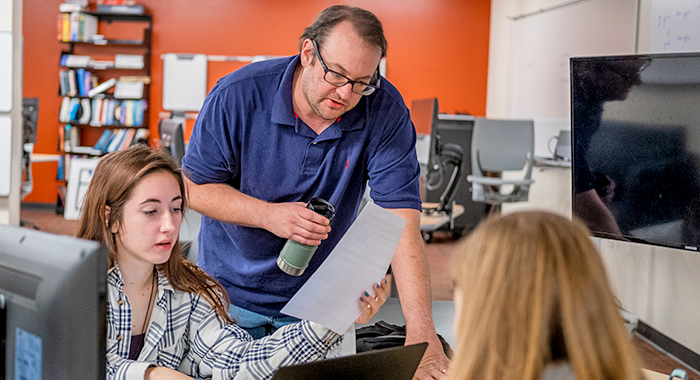New Prof Brings Decades of Experience in Video-Game Industry
Long days and nights of uninterrupted programming. Sixty-hour work weeks. Pushing the boundaries of console gameplay. The thrill of creating another hit video game.
For more than 20 years, this was the norm for Ben Geisler (Computer Science), a software-engineer-turned-professor who joined the St. Norbert faculty this summer. Geisler holds a Ph.D. in computer science from Nova Southeastern University and a Master of Science from the University of Wisconsin-Madison.
In his first career, Geisler helped develop a number of blockbuster games for Microsoft’s Xbox 360 and Xbox One, Sony’s Playstation (PS2 through PS4), Nintendo’s Gamecube and Wii-U, and mobile games for Android. He’s worked for a number of well-known companies in the gaming world, including Activision, Raven Software and Radical Entertainment Inc. Games like “Batman: Arkham Origins,” “Star Wars Jedi Knight II: Jedi Outcast” and “Quake 4” are just a few of the dozens upon dozens of titles he’s had a hand in bringing to gaming consoles across the world. His latest contribution, a role-playing game called “Rune 2” by Human Head Studios, is due out this November.
But when he looks back on his long list of achievements, he didn’t hesitate to say that running his own company, Frozen Codebase, based in downtown Green Bay from 2006 to 2011, has been his proudest so far. It’s also what inspired his interest in academia. (Before joining St. Norbert, Geisler lectured at the University of Wisconsin-Green Bay and at the University of Wisconsin-Milwaukee.)
“I don’t regret my time in the industry. It was always very fun, and the creative aspects can’t be beat, but I have a family now and I want to teach,” he says. “No joke, I once worked from 9 a.m. on one day until 5 p.m. the next, a total of 32 hours straight.”
That kind of dedication might sound crazy to most, but to him, satisfying that passion – that creative zeal – is as equally important as balancing needs outside of it. Sometimes, it’s about knowing limits and whether or not to push them, Geisler says.
That’s the kind of wisdom he’s trying to impart in classrooms full of college-aged students, while also teaching practical skills and concepts they need for an industry he’s experienced firsthand.
Creating code in college
Geisler teaches upper- and lower-level students studying computer science and computer programming. It’s his job to guide them through the fundamentals, but he also introduces difficult concepts to push them past their comfort zone. One concept has been parsing, or making a new programming language.
“Some of them have gotten so good at it that once on the board I made a mistake and luckily a student caught it! I tried to also use this as a lesson that not any one person can be right all the time, and not any one person can know everything, especially in a topic that changes minute by minute,” he says.
Geisler says a strong foundation of logic and problem-solving is something a student needs before attempting to create a video game. Games are built using practices that encourage thinking outside of the box, that foster collaboration within teams, and that rely on each person’s ability to problem-solve and find a solution while going through the game’s processes hundreds of times.
“This is something that’s hard to teach because students also need the fundamentals,” says Geisler. “If the fundamentals [of programming] aren’t present, you can’t be creative with your problem solving.”
Drawing from experience
In his previous career, Geisler also produced software for Insitu Inc., a company that designs and manufactures unmanned aerial systems, that controls multiple drones at the same time from another device like a tablet or laptop. From that, he learned app-development skills that directly relate to some of the programming he teaches.
While completing his Ph.D., Geisler created a new programming language that he named GAMESPECT, which makes game development easier for an entire team. He hopes to bring on some student researchers to extend the programming language.
Geisler also plans to dive into game balance, a newer area in video-game production in which Geisler hopes to discover a way to combine programming language and artificial intelligence in order to improve gameplayer experience.
“These routines can be used toward game balancing to make a better, more interesting and engaging game,” says Geisler. “I believe my master’s work in [artificial intelligence] at UW-Madison combined with my Ph.D. work in languages should enable me to make a significant contribution.”
Creating new video games isn’t off the table now that Geisler is a full-time academic. He hopes to dedicate his summers to new projects. He says: “It keeps me fresh!”
Oct. 22, 2019












